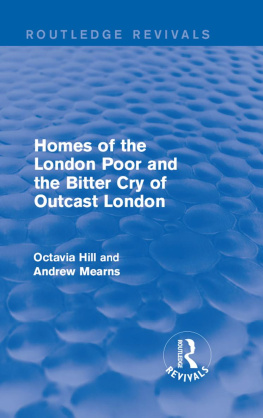COTTAGE PROPERTY IN LONDON.
November 1, 1866.
The subject of dwellings for the poor is attracting so much attention, that an account of a small attempt to improve them may be interesting to many readers, especially as the plan adopted is one which has answered pecuniarily, and which, while it might be undertaken by private individuals without much risk, would bring them into close and healthy communication with their hard-working neighbors.
Two years ago I first had an opportunity of carrying out the plan I had long contemplated, that of obtaining possession of houses to be let in weekly tenements to the poor. That the spiritual elevation of a large class depended to a considerable extent on sanitary reform was, I considered proved, but I was equally certain that sanitary improvement itself depended upon educational work among grown-up people; that they must be urged to rouse themselves from the lethargy and indolent habits into which they have fallen, and freed from all that hinders them from doing so. I further believed that any lady who would help them to obtain things, the need of which they felt themselves, and would sympathize with them in their desire for such, would soon find them eager to learn her view of what was best for them; that whether this was so or not, her duty was to keep alive their own best hopes and intentions, which come at rare intervals, but fade too often for want of encouragement. I desired to be in a condition to free a few poor people from the tyranny and influence of a low class of landlords and landladies; from the corrupting effect of continual forced communication with very degraded fellow-lodgers; from the heavy incubus of accumulated dirt: that so the never-dying hope which I find characteristic of the poor might have leave to spring, and with it such energy as might help them to help themselves. I had not great ideas of what must be done for them, my strongest endeavors were to be used to rouse habits of industry and effort, without which they must finally sinkwith which they might render themselves independent of me except as a friend and leader. The plan was one which depended on just governing more than on helping. The first point was to secure such power as would enable me to insist on some essential sanitary arrangements.
I laid the plan before Mr. Ruskin, who entered into it most warmly. He at once came forward with all the money necessary, and took the whole risk of the undertaking upon himself. He showed me, however, that it would be far more useful if it could be made to pay; that a working man ought to be able to pay for his own house; that the outlay upon it ought, therefore, to yield a fair percentage on the capital invested. Thus empowered and directed, I purchased three houses in my own immediate neighborhood. They were leasehold, subject to a small ground-rent. The unexpired term of the lease was for fifty-six years; this we purchased for 750. We spent 78 additional in making a large room at the back of my own house, where I could meet the tenants from time to time. The plan has now been in operation about a year and a half; the financial result is that the scheme has paid five per cent. interest on all the capital, has repaid 48 of the capital; sets of two rooms have been let for little more than the rent of one, the houses have been kept in repair, all expenses have been met for taxes, ground-rent, and insurance. In this case there is no expense for collecting rents, as I do it myself, finding it most important work; but in all the estimates I put aside the usual percentage for it, in case hereafter I may require help, and also to prove practically that it can be afforded in other cases. It should be observed that well-built houses were chosen, but they were in a dreadful state of dirt and neglect. The repairs required were mainly of a superficial and slight character: slight in regard to expensevital as to health and comfort. The place swarmed with vermin; the papers, black with dirt, hung in long strips from the walls; the drains were stopped, the water supply out of order. All these things were put in order, but no new appliances of any kind were added, as we had determined that our tenants should wait for these until they had proved themselves capable of taking care of them. A regular sum is set aside for repairs, and this is equally divided between the three houses; if any of it remains, after breakage and damage have been repaired, at the end of the quarter, each tenant decides in turn in what way the surplus shall be spent, so as to add to the comfort of the house. This plan has worked admirably; the loss from carelessness has decreased to an amazing extent, and the lodgers prize the little comforts which they have waited for, and seem in a measure to have earned by their care, much more than those bought with more lavish expenditure. The bad debts during the whole time that the plan has been in operation have only amounted to 2 11s. 3d. Extreme punctuality and diligence in collecting rents, and a strict determination that they shall be paid regularly, have accomplished this; as a proof of which it is curious to observe that 1 3s. 3d. of the bad debts, accumulated during two months that I was away in the country. I have tried to remember, when it seemed hardest that the fulfillment of their duties was the best education for the tenants in every way. It has given them a dignity and glad feeling of honorable behavior which has much more than compensated for the apparent harshness of the rule.
Nothing has impressed me more than the people's perception of an underlying current of sympathy through all dealings that have seemed harsh. Somehow, love and care have made themselves felt. It is also wonderful that they should prize as they do the evenness of the law that is over them. They are accustomed to alternate violence of passion and toleration of vice. They expected a greater toleration, ignorant indulgence, and frequent almsgiving; but in spite of this have recognized as a blessing a rule which is very strict, but the demands of which they know, and a government that is true in word and deed. The plan of substituting a lady for a resident landlady of the same class as her tenants is not wholly gain. The lady will probably have subtler sympathy and clearer comprehension of their needs, but she cannot give the same minute supervision that a resident landlady can. Unhappily, the advantage of such a change is, however, at present unquestionable. The influence of the majority of the lower class of people who sub-let to the poor is almost wholly injurious. That tenants should be given up to the dominion of those whose word is given and broken almost as a matter of course, whose habits and standards are very low, whose passions are violent, who have neither large hope nor clear sight, nor even sympathy, is very sad. It seems to me that a greater power is in the hands of landlords and landladies than of school-teacherspower either of life or death, physical and spiritual. It is not an unimportant question who shall wield it. There are dreadful instances in which sin is really tolerated and shared; where the lodger who will drink most with his landlord is most favored, and many a debt overlooked, to compensate for which the price of rooms is raised; and thus the steady and sober pay more rent to make up for losses caused by the unprincipled. But take this as an example of entirely careless rule: The owner of some cottage property in London, a small undertaker by trade, living some little distance from his property, and for the most part confining his dealings with it to a somewhat fruitless endeavor to collect the rents on a Sunday morning, in discussing the value of the property with me, said very straightforwardly, "Yes, miss; of course there are plenty of bad debts. It's not the rents I look to, but the deaths I get out of the houses." The man didn't mean for a moment that he knew that the state of the houses brought him a plentiful harvest of deaths, though I knew it, and heard the truth ringing with awful irony through his words; but he did mean that his entire thought was of his profitsthat those dependent souls and bodies were to him as nothing. Consider under such a rule what deadly quarrels spring up and deepen and widen between families compelled to live very near one another, to use many things in common, whose uneducated minds brood over and over the same slight offenses, when there is no one either compulsorily to separate them, or to say some soothing word of reconciliation before the quarrel grows too serious. I have received a letter from an Irish tenant actually boasting that he "would have taken a more manly way of settling a dispute," but that his neighbor "showed the white feather and retired." I have seen that man's whole face light up and break into a smile when I suggested that a little willing kindness would be a more manly way still. And I have known him and his aunt, though boiling over with rage all the time, use steady self-control in not quarreling for a whole month, because they knew it would spoil my holiday! Finally, they shook hands and made peace, and lived in peace many months, and, indeed, are living so now.












